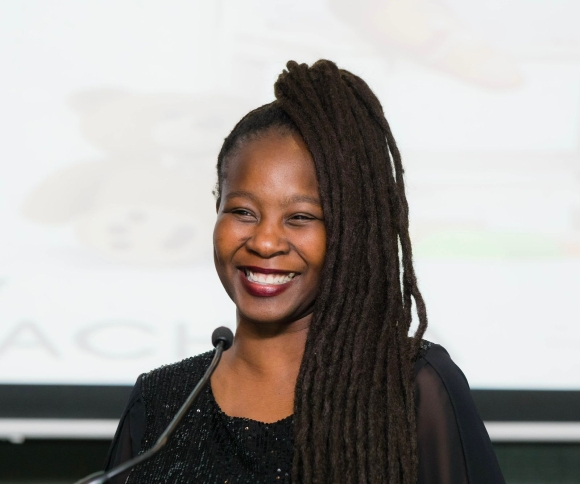Representing Global Surgery and Sometimes, All of Africa
Salome Maswime is used to being the only African woman in the room at high-level global health meetings, and at the age of 40, sometimes even the youngest. Maswime, head of the Global Surgery Division at the University of Cape Town, was named one of the 50 most powerful women in South Africa and one of 20 Young Shapers of the Future in Health and Medicine.
An OB-GYN by training, Maswime knows that access to C-sections is a major indicator of access to surgery in general. She parlayed that background to become a leader in global surgery, an emerging field that focuses on access to procedures and closing gaps in surgical outcomes.
Maswime, who recently gave the keynote speech at the Johns Hopkins Global Surgery Symposium, spoke with GHN about the evolution of her work, and the importance of diverse representation in global health.
What is global surgery?
It is a new discipline in medicine which focuses on access to surgery and improving quality of care and outcomes. I like to describe it as the interface between surgical services and surgical systems. For so long, surgeons have focused on the surgery they are providing in-house in their hospitals, but we are starting to be aware of the wide disparities between surgical outcomes across geographical settings. It is important to mention that there is not enough consensus across the world about what global surgery is and what people do in the field. For many in high income countries, it may be mainly policy work, strengthening surgical services across countries, and for others, it may be operating in other countries. For those of us who live in LMICs, that may not be quite it.
How has your training as an OB-GYN informed your work in this field?
My PhD was on measures to reduce hemorrhage from C-sections, specifically to reduce morbidity and mortality from those procedures. I naturally went into the global health sphere from there because I learned more about access to care and implementation science as it pertained to C-sections. I decided I wanted to learn more about global health which took me to Massachusetts for a research fellowship. Once I began that work, I found out about the world of global surgery and actually learned that the work I had done for my PhD was quite well known and even quoted by leaders in global surgery. So it was quite a serendipitous relationship—I actually felt like I had long been doing global surgery work. C-sections are the most widely performed surgeries in the world, and access to them is a major indicator of access to surgery in general. If you go to a hospital and the only surgeries available are C-sections, you can immediately tell that they are decades behind.

Dr. Salome Maswime
South Africa has made huge strides in improving maternal health outcomes, from a staggering 219 deaths per 100,000 live births in 2010 to 78 per 100,000 in 2020. What can other countries—like the US, which has very poor maternal health outcomes—learn from this?
I think South Africa has done well with having the National Committee on Confidential Enquiries into Maternal Deaths as well as the Saving Mothers, Saving Babies report. There is a lot of transparency around the causes of death, how many women are dying, and what the recommendations are to improve. Very few countries have this. The model used for reporting is similar to the one used in the UK. With my stillbirth work [involving advocacy for better record-keeping of stillborn births], I still find that a lot of high-income countries haven’t done it as well as South Africa. I think this would be great for the world to see. It is hard to compare maternal mortality statistics globally though. While the majority of cases are African women, this cannot be compared to the US. In reality, as an accomplished African woman with health insurance, I would not expect to face discrimination in South Africa as I might in the United States.
You’ve long been an advocate for women’s health. Are there any specific initiatives you are currently passionate about?
My research is working on improving perinatal outcomes and stillbirth auditing across Africa. In many countries, we don’t know what the real numbers are at the end of the day, so we have to start counting. More importantly though, the role of women in their societies can tell us a lot. Communities that protect their women seem to have better health outcomes. This means the starting point is not just medical guidelines, but considering what is the value of women in their society? I tend to advocate for women’s health through that lens. Of course, aside from women’s health, global surgery means I also continue to speak for access to surgery across the disciplines – men’s health, congenital abnormalities, cancer, and more.
You have mentioned that you are often one of very few African women at international global health meetings. How has that impacted your voice in these rooms?
It's always the elephant in the room. When you walk into a room, and you don't see anyone that looks like you, sometimes you don't know if you are welcome or not. Luckily, i am comfortable with situations where I am minority. When we talk about adverse outcomes in African or Black women, I am also included. It's us, women like me and you. I cannot say it's a problem that doesn't affect me. Essentially though, if I happen to be the only Black woman in the room. I remain very comfortable with that. For those who invite me, perhaps they think they are checking the diversity box. For me though, I am not a diversity box. I see myself as an expert and not as an equity candidate. I would like you to listen to me as a global expert, and not as a local expert visiting a high income country.
Have you felt pressure to represent the experiences of all of Africa?
I have walked into international meetings and they literally said “Africa has arrived!” Almost like I represented over a billion people. If they mention something in sub-Saharan Africa, they would turn to me to get an opinion. This can sometimes be on things that I am not well versed in. But I am very clear about what my expertise is. It is also a sense of pressure and responsibility because I often feel that if a wrong decision is made, I am not speaking just for me, but for many. There needs to be more people at the table. No international meeting should be fine and comfortable with not having representation across races and continents. Yet, I know there are many technical working meetings on global health happening where we are not represented at all. Considering that most of the adverse outcomes are in sub-Saharan Africa, there is almost always going to be a discussion about those countries. While I have been to some meetings that were well represented, I have been to many more where Asian and African representatives are few and far between.
What do you envision for your career over the next 5-10 years?
That’s a million dollar question. First, I would like to continue leading the University of Cape Town into building what I believe is a top global surgery program. I would love for the world to see and to be a part of what we are doing. The more important thing, perhaps around my own life, is global health leadership. For African women to really make an impact, we need a seat at the table. What I am looking to see is which table that I want to sit at. Generally, I would like to see global surgery established as a respected discipline in medicine.
Ed. Note: This interview was edited for clarity and length.
For more information on Global Surgery news or for current initiatives and programming of the Global Surgery Foundation, please visit https://www.globalsurgeryfoundation.org/
Diamanta Panford-Ufere is a medical student at Northeast Ohio Medical University and an MPH candidate at the Johns Hopkins Bloomberg School of Public Health. Her interests include advocating for underserved communities, highlighting the culture of Black and Brown communities, and learning about effective public health strategies.
Join the 50,000+ subscribers in 170+ countries who rely on Global Health NOW summaries and exclusive articles for the latest public health news. Sign up for our free weekday newsletter, and please share the link with friends and colleagues. https://www.globalhealthnow.org/subscribe
Closeup of a surgeon in green scrubs and her assistants operating on a patient. Universal Images Group Getty





